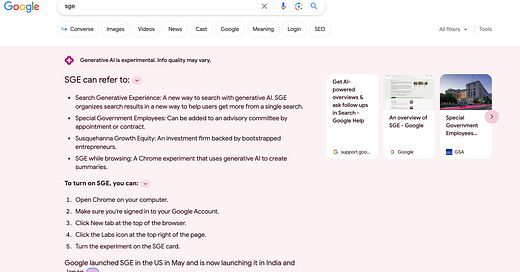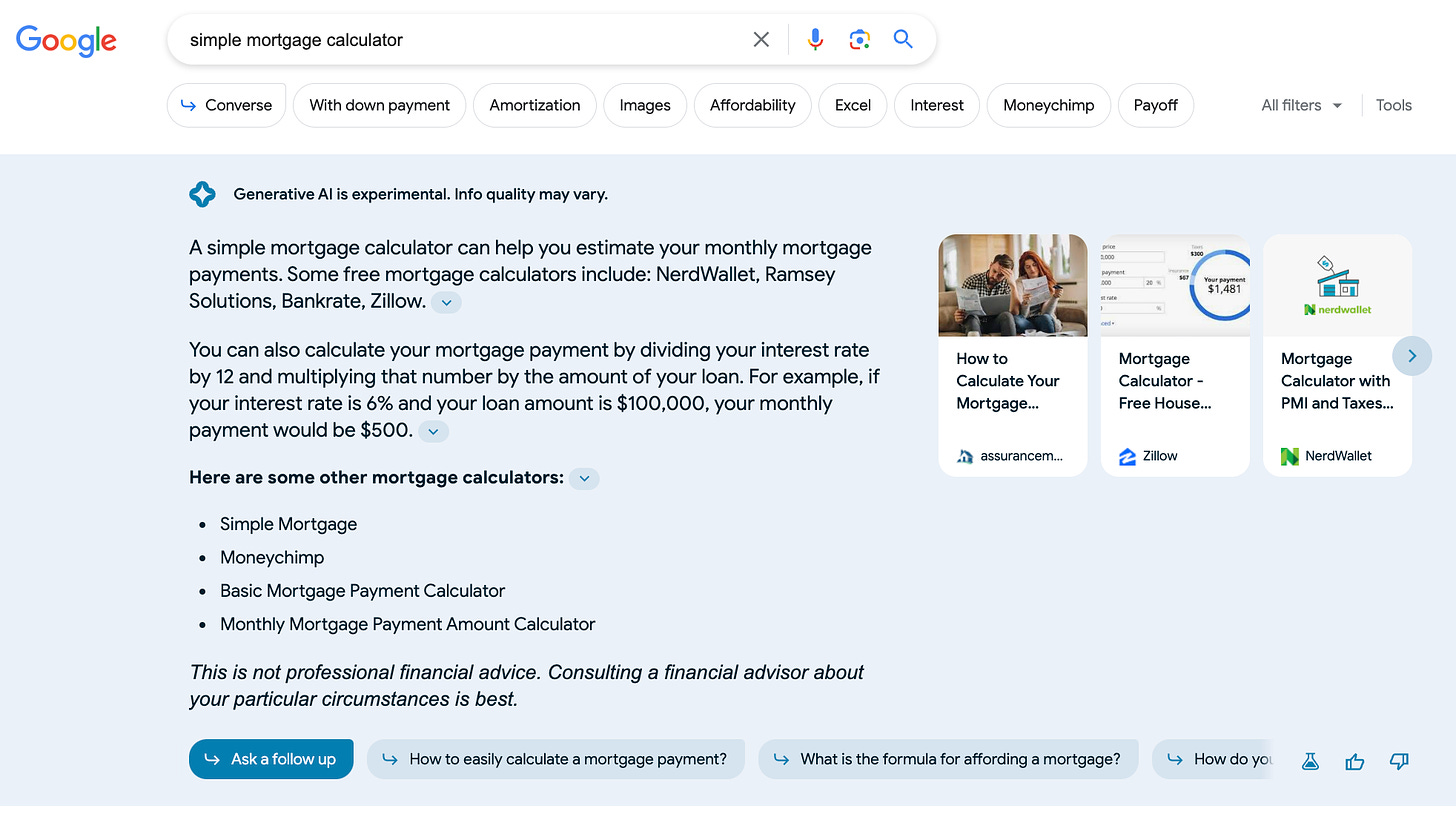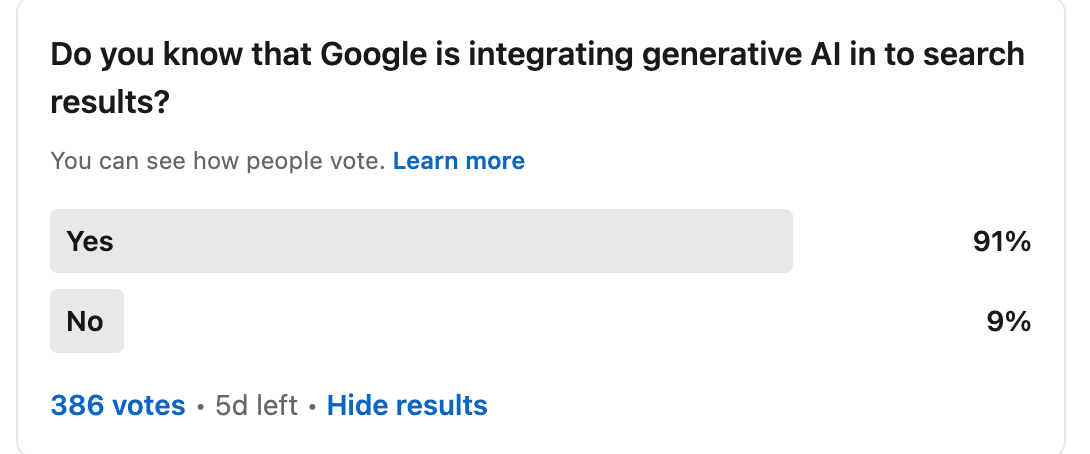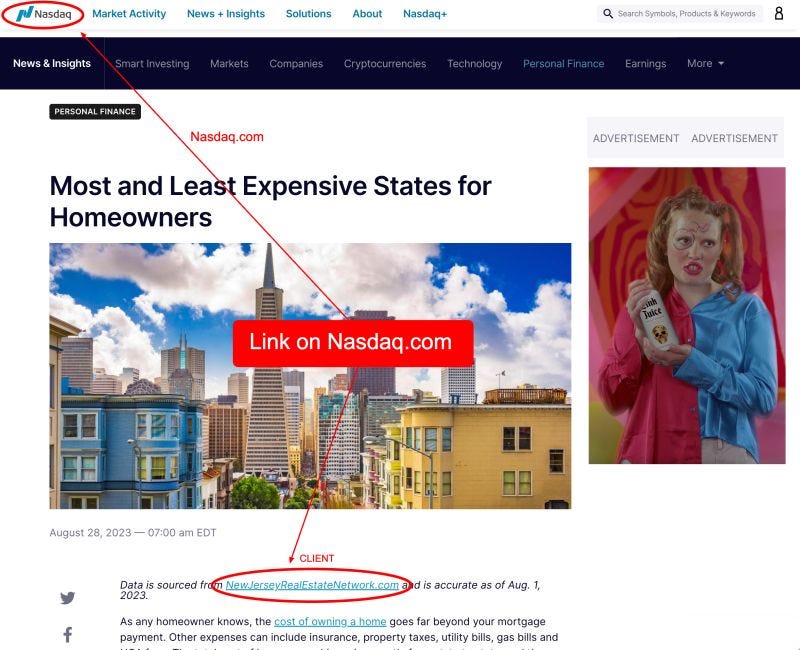Google's Generative AI a launch prediction and updates
This week’s newsletter is sponsored by the Digital PR agency Search Intelligence. See their case study at the end of the newsletter.
The podcast I co-host was fortunate to have the best-selling author and consulting legend Alan Weiss as our first and only guest. Subscribe now to hear it when it launches, and please get in touch if you are interested in sponsorship opportunities.
I ran a poll on LinkedIn and discovered that 50% of you want me to write a post on how to use TAM to forecast SEO revenue, and that post is coming soon. If you ever have newsletter ideas, I always welcome suggestions.
Predictions on Google’s SGE launch
While many in the tech industry believe that Google’s efforts at integrating generative AI into search results are doomed to fail and will never launch, I staunchly believe the opposite.
Before I get into the update on what has changed in the last month, I want to share a few predictions.
How it will launch
Currently, Google’s generative AI integration (SGE) is an opt-in beta that Google will eventually launch to all its users more broadly. Users who opt into the beta of SGE see generative AI possibilities (either an AI response or an autogenerated response) when logged into their Google account. When Google does launch this more broadly, they will take off this log-in restriction and show generative AI answers to all searchers in the regions where this feature is available.
One of Google's challenges in launching this more broadly is the legal issue of what happens when the results are incorrect or harmful. We live in a litigious world, so Google will most certainly be challenged, and they want to ensure that they at least have a fighting chance to win. I don’t think this will ever be fully mitigated, so my first prediction is that Google will launch it more broadly while excluding more legally risky areas like the EU. It will not be included for searchers using Workspace accounts since those users have commercial contracts with Google to provide accurate services.Search Impact
In Google’s perfect world, they would have incorporated LLM into their various products, but they would not have made it a core search feature, given how much it impacts how they deliver their services. Unfortunately for them, Open AI forced their hand with the release of ChatGPT, and Google was forced to play catch up. The growth of ChatGPT has slowed, so that’s helpful, but it’s still a threat.
My guess and this is only a guess, is that the rushed timeline will mean that Google has far less time to tune the perfect product that will not rock the boat on the current search experience. Suppose they go live with the product they are currently testing. In that case, I predict that informational sites will lose 30-50% of their top-of-funnel traffic - the types of keywords that have an SGE response, while transactional/service sites will lose 5-20% of traffic but have a less impactful revenue drop.Loss of data
Unfortunately for marketers, a byproduct of the fast release timeline is that there is less time to build ancillary products for SGE; I predict that we will go backward in our data availability from search visibility until Google gets around to building a new solution. Advertisers may have impacts, but they will be far more muted, given the importance of ad revenue to Google. The fear of a revenue loss is likely factoring into the launch timeline.When it will launch
I have no hard data to share, so this is just an opinion based on research and conjecture. However, I predict that SGE will be publicly available with the caveats in the previous predictions before the holiday shopping season, if not sooner. While there will be a lot of angst from retailers about how SGE will impact shoppers, it probably will not affect overall revenue much, even if it highly impacts search traffic. If I had to pick a date it would launch, my prediction is, at the latest, the week before Thanksgiving, as Google would not want to make major launches during the holiday season. If they miss this launch date, it cannot launch until January.
For two random data points around this prediction and acceleration in attention to SGE:On August 30th, Google launched its first newsletter for Bard (The standalone generative AI tool)
More critically, on August 31st, Google turned on SGE in India and Japan
Updates on SGE
SGE launched at an odd time, right before Memorial Day, with little fanfare, and in the five months it has been out in an invite-only beta, it has been changing quite rapidly. Initially, I saw SGE on nearly every query I tried, and on many of those queries, ads were replaced by SGE results. I then saw Google put the ads back on top of SGE results while also removing SGE from queries that could be sensitive or expensive.
As had been documented by many on social media, there have been laughable and even offensive SGE results. Those will probably never go away due to the nature of LLM’s, but they have vastly improved. This is where the legal risk comes into play.
Take this result below as an example.
It gives different possibilities as a response, and it almost replicates a search result and allows a user to take action with the integrated links. (Note on the links: initially, there were no links at all, then Google pulled links in, then integrated them in the format below, which they shared in the India launch announcement that this is how they will stay.)
In addition to including links within the content, Google also includes more rich media. Note the video below that can be played right in the result. Funny enough, it is a bit of a mismatch because the query is about a Mac because the video comes from HP. 🤷♂️
Look at the result below as an example of a constantly shifting landscape when SGE results show up (in support of my earlier traffic prediction). The obvious result should be an actual calculator, and Google does have one, but the SGE result is a content response.
Interestingly, mortgages are an area where SGE seems to be a moving target. At launch, the query “mortgage rates” generated a very updated content response referencing the previous day’s rates. At present, there is no SGE response at all. Google is incorporating all feedback on SGE; what you see today can always change.
Now for some good news for marketers.
Most people in the world are unaware of the hurricane that Google is about to unleash on search. I was even completely surprised when I met with SEO teams with no idea what SGE was. I wrongly assumed that everyone who derived their income from SEO made it a priority to be aware of everything happening in search, especially big things. To put data behind this, I posted a poll on Linkedin to an audience I believe is mostly tech industry people, and 9% of respondents were unaware of SGE.
This means that when this storm hits the search traffic of websites wherever Google launches it, there will be a lot of anxiety. It will be up to the SEO team to navigate these choppy waters, and in the current economic climate where all jobs are less secure, this will be a great time to be needed.
Take the time to develop a point of view on inoculating traffic against SGE before it launches (mine is to focus on mid-funnel), and you will be in a great position very soon.
[Sponsored]
This campaign earned links on Nasdaq, Entrepreneur, Yahoo News, and 10 other websites by analysing US census data.
This is how we've done it:
✅ We analysed US census data to find the average yearly housing cost in each state as a proportion of median income.
Housing costs included:
- Mortgage repayments
- Various insurances
- Property taxes
- Utility bills
- Fuel bills
- Mobile home costs
- Condominium fees
✅ The data revealed that:
Read MORE








